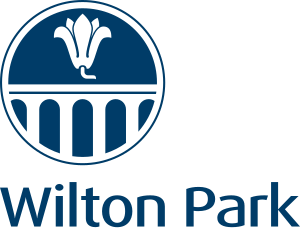Wilton Park facts for kids
 |
|
| Agency overview | |
|---|---|
| Formed | 12 January 1946 |
| Headquarters | Wiston House, West Sussex |
| Agency executives |
|
| Parent department | Foreign, Commonwealth and Development Office |
Wilton Park is a special part of the UK government. It works with the Foreign, Commonwealth & Development Office. Its main job is to create a place where people from all over the world can talk about important global issues.
Since 1951, Wilton Park has been based at Wiston House in Sussex. Each year, it holds over 70 meetings, both in the UK and in other countries. These meetings bring together important people like politicians, business leaders, academics, diplomats, and journalists.
In 2021, Wilton Park celebrated its 75th birthday, marking many years of helping global discussions.
Contents
What Is Wilton Park?
Wilton Park is like a special meeting place for world leaders and experts. It helps them discuss big problems and find solutions together. Think of it as a global club for important conversations.
How Wilton Park Helps the UK
Wilton Park is an "executive agency." This means it's a part of the UK government but can run itself a bit more freely. It helps the UK by bringing people together to talk about peace, security, and other global challenges.
Wilton Park's History: A Look Back
Wilton Park started on January 12, 1946. It was founded by Heinz Koeppler. The idea came from Winston Churchill, who wanted Britain to help Germany become a democracy after World War II. A democracy is a country where people choose their leaders.
Early Days: Teaching Democracy
The first Wilton Park was at the Wilton Park Estate in Buckinghamshire. From 1946 to 1948, over 4,000 Germans came there. They attended special classes to learn about democratic ideas. They talked with important political figures and thinkers.
Becoming Independent
In 1991, Wilton Park became an "Executive Agency." This gave it more freedom to make its own decisions and manage its money. Now, it raises all the money it needs to operate.
Important Visits and Events
- In 1968, Prince Philip, Duke of Edinburgh visited Wilton Park for its 100th meeting.
- In 1980, Wilton Park hosted secret meetings for representatives from South Africa.
- In 1988, Wilton Park held its first meeting outside the UK, in Helsinki, to discuss Europe's future.
- In 2006, Wilton Park celebrated its 60th anniversary. Lord Triesman gave a speech about future conflicts.
- In 2010, Wilton Park held its first meeting about cyber security. This was after the UK decided that cyber attacks were a big threat.
Who Leads Wilton Park Now?
The Rt Hon Baroness Gisela Stuart became the Chair of Wilton Park in October 2018. Tom Cargill has been the Chief Executive since January 2021.
Wilton Park Dialogues: Global Conversations
Wilton Park organizes special events called "dialogues" to discuss important global issues. These events usually happen in person. However, they can also be online or a mix of both.
Meetings During the COVID-19 Pandemic
During the COVID-19 pandemic in 2020-21, Wilton Park held over 100 online meetings. This allowed important discussions to continue even when people couldn't meet in person.
Where Meetings Take Place
Most Wilton Park dialogues happen at Wiston House. But they also take place in other locations. More and more, meetings are held in different countries around the world. Wilton Park has hosted conferences in places like Slovenia, Sweden, USA, Japan, Brazil, and Germany.
How Discussions Work
Wilton Park meetings offer a safe place for people with different ideas to talk. They can share their views openly and calmly. This helps them find common ground and solutions. The goal is to encourage new ideas and include many different voices.
Discussions are held under the "Chatham House Rule." This means people can use the information from the meeting, but they can't say who said what. This helps everyone speak freely and honestly.
Key Topics Wilton Park Discusses
Wilton Park focuses on many important global topics, including:
- Preventing and solving conflicts
- Defence and security
- The global economy
- Global health issues
- Human rights and good government
- Working with international organizations and key countries
- Sustainable development and protecting the environment
 | Sharif Bey |
 | Hale Woodruff |
 | Richmond Barthé |
 | Purvis Young |

